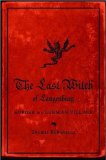
Murder in a German Village
by Thomas Robisheaux
On the night of the festive holiday of Shrove Tuesday in 1672 Anna Fessler died after eating one of her neighbor's buttery cakes. Could it have been poisoned? Drawing on vivid court documents, eyewitness accounts, and an early autopsy report, historian Thomas Robisheaux brings the story to life. Exploring one of Europe's last witch panics, he unravels why neighbors and the court magistrates became convinced that Fessler's neighbor Anna Schmieg was a witch—one of several in the area—ensnared by the devil.
Once arrested, Schmieg, the wife of the local miller, and her daughter were caught up in a high-stakes drama that led to charges of sorcery and witchcraft against the entire family. Robisheaux shows how ordinary events became diabolical ones, leading magistrates to torture and turn a daughter against her mother. In so doing he portrays an entire world caught between superstition and modernity.
"Starred Review. Drawing on rich records of the trials of Schmeig and her family, Robisheaux finely crafts a vivid glimpse of a time, place and state of mind that, though remote, is all too familiar." - Publishers Weekly.
"The reader might wish for a modern medical opinion on why Anna's supposed victim died, but this is only a minor omission from a superb work." - Library Journal.
"Robisheaux's work offers a fascinating way of understanding witchcraft 'at the level where real life was lived.' Compelling social and legal history." - Kirkus Reviews.
This information about The Last Witch of Langenburg was first featured
in "The BookBrowse Review" - BookBrowse's membership magazine, and in our weekly "Publishing This Week" newsletter. Publication information is for the USA, and (unless stated otherwise) represents the first print edition. The reviews are necessarily limited to those that were available to us ahead of publication. If you are the publisher or author and feel that they do not properly reflect the range of media opinion now available, send us a message with the mainstream reviews that you would like to see added.
Any "Author Information" displayed below reflects the author's biography at the time this particular book was published.
Thomas Robisheaux, a professor of history at Duke University, is also the author of Rural Society and the Search for Order in Early Modern Germany. He lives in Durham, North Carolina.






Believe those who are seeking the truth. Doubt those who find it.
Click Here to find out who said this, as well as discovering other famous literary quotes!
Your guide toexceptional books
BookBrowse seeks out and recommends the best in contemporary fiction and nonfiction—books that not only engage and entertain but also deepen our understanding of ourselves and the world around us.